Best Self-care Ideas for Women for the New Year 2025
Self-care is an essential practice that helps women maintain overall well-being.
In today’s fast-paced world, self-care has never been more important!
Prioritizing self-care can help us recharge, reduce stress, improve our overall quality of life, and help us to give our best to the world.
In this article, Self-care Ideas for Women for the New Year, we’ll explore various self-care ideas for women, including activities that can be done at home, in nature, or with others.
Whether you’re looking for ways to relax and unwind or want to explore new hobbies and interests, there’s sure to be a self-care idea on this list that speaks to you.
This post may contain affiliate links. Click to visit policies and disclosures

The Definition of Self-care
According to The World Health Organization, self-care is the ability of individuals, families, and communities to promote health, prevent disease, maintain health, and cope with illness and disability with or without the support of a health worker.
Improving Health and Well-being on Purpose
Self-care is taking deliberate actions to improve physical, mental, and emotional health and well-being.
This can include various activities, such as exercise, healthy eating, restful sleep, mindfulness, and relaxation.
Self-care aims to prioritize one’s needs and cultivate a greater sense of balance, joy, and fulfillment.
Self-care is essential for everyone, regardless of age, gender, or lifestyle, and can help prevent burnout, reduce stress, and improve the overall quality of life.
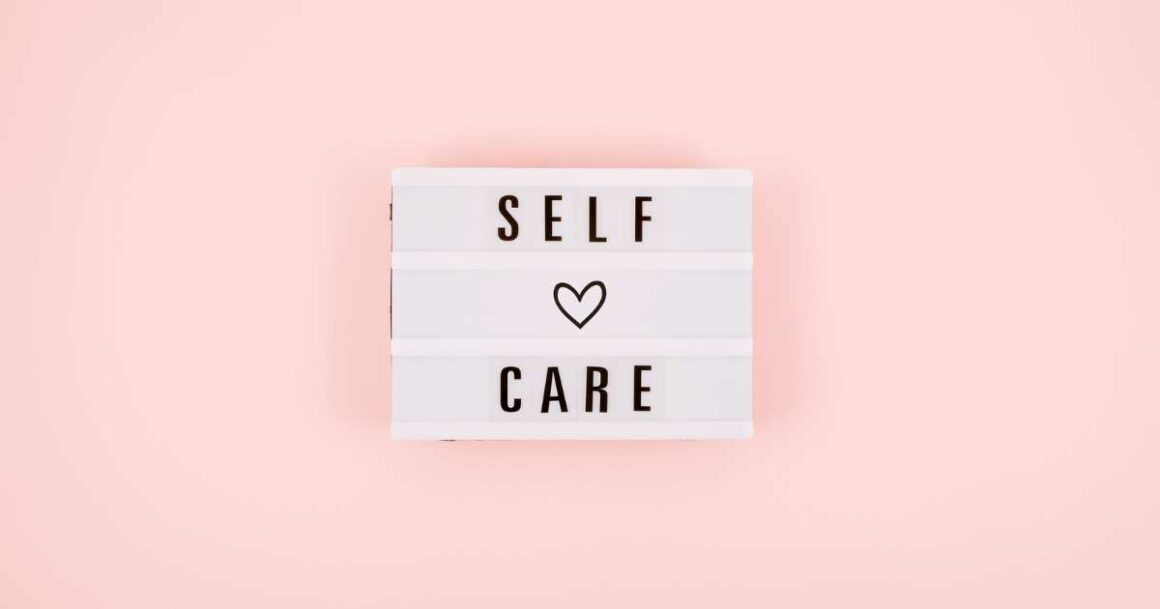
The Eight Different Types of Self-care
There are eight types of self-care, each of which is important.
Incorporating these different types of self-care into your life can improve your overall well-being and quality of life.
The Eight Types of Self-care:
Physical self-care
Activities supporting physical health and wellness include exercise, healthy eating, and getting enough sleep.
Mental self-care
Practices supporting mental health and well-being include therapy, mindfulness, and journaling.
Emotional self-care
Activities that promote emotional well-being and help manage stress and anxiety include talking with a trusted friend or practicing gratitude.
Environmental self-care
Practices supporting a healthy environment include decluttering, creating a calm workspace, and spending time in nature.
Professional self-care
Activities supporting career growth and job satisfaction include taking breaks, setting boundaries, and learning new skills.
Social self-care
Practices that nurture relationships and social connections include spending time with loved ones, joining a group or club, and volunteering.
Spiritual self-care
Activities promoting spiritual growth and connection include meditation, prayer, and practicing gratitude.
Related article: How to Practice Spiritual Self-care
Financial self-care:
Practices that support financial health and well-being include creating a budget, saving for the future, and seeking professional advice.

The Best Self-Care Ideas for Women for the New Year!
1. Drink More Water than you think you need
Drinking water first thing in the morning and throughout the day is essential for good health.
Starting your day with a glass of water can help jumpstart your metabolism, hydrate your body, and promote healthy digestion.
Drinking water throughout the day can also help prevent dehydration, improve cognitive function, and keep your skin looking healthy and hydrated.
Drink 8-10 glasses daily to maintain optimal hydration and overall well-being.
Related article: Drink the dang water! (a users guide)

2. Enjoy a Morning Quiet Time
Starting your day with a quiet morning can be an excellent way to practice self-care and set a positive tone for the day ahead.
Activities to include in your morning quiet time routine:
Drink a perfect cup of coffee
Enjoying a warm cup can help you wake up and feel energized for the day ahead. So make your coffee how you like it, and savor each sip.
Related Article: How to Turn Your Coffee Routine into a Ritual
Play Wordle
Engage your mind and have fun by playing a game like Wordle. Challenge yourself to improve your score each day.
Read the Bible
Reading the Bible can provide peace and grounding to start your day. Choose a passage that resonates with you and reflect on its meaning.
I like to read a Proverb a day (there are 31, which makes it perfect) 🙂
Consider journaling about what you read or writing your favorite bible verse from the morning on a sticky note and putting it somewhere you will see it throughout the day.
Make a to-do list
Creating a to-do list can help you prioritize tasks and feel organized for the day ahead. Write down the essential functions you need to accomplish and prioritize them in order of importance.
Pray
Time to pray can help you focus your mind and center your spirit for the day ahead.
Whether you prefer to pray silently or out loud, expressing gratitude and asking for guidance can be a powerful way to start your day with intention and purpose.
Related Article: Powerful Things to Pray in the New Year
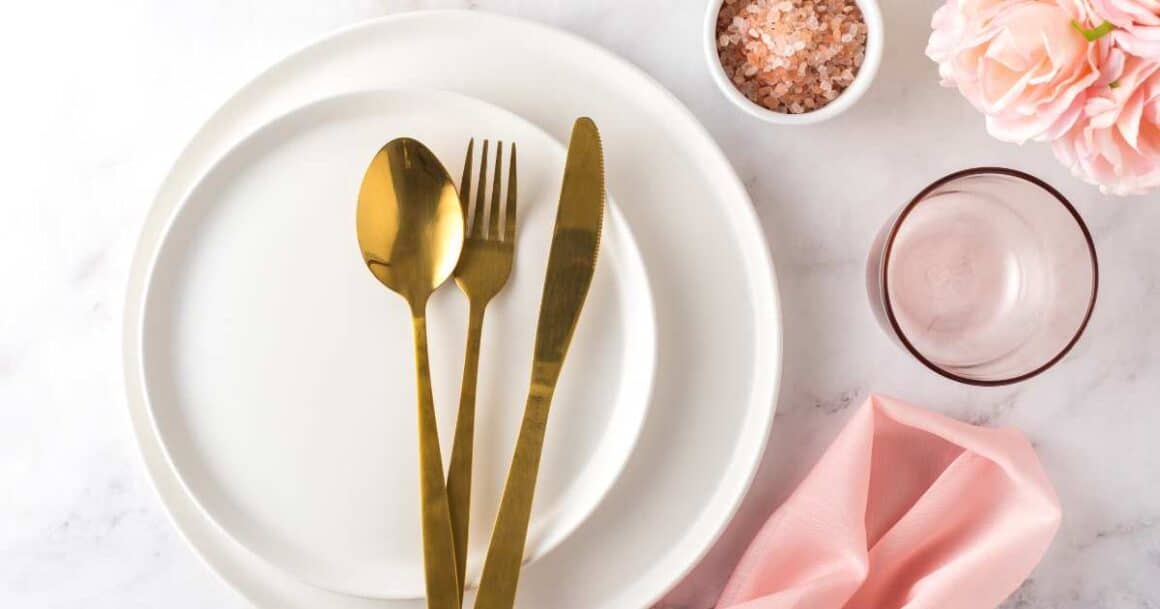
3. Make Your Favorite Meal.
Making your favorite meal is a fun and delicious way to practice self-care and indulge in something you love.
Whether it’s a comfort food from childhood or a fancy dish you’ve always wanted to try, cooking your favorite meal can be a satisfying and rewarding experience.
Preparing your favorite meal for you alone or in a large group can provide comfort and happiness and be a great way to celebrate yourself and your love of good food.
Set the table with your favorite things for bonus points:
Use your favorite dishes
Whether it’s fine china or a set of colorful plates, your famous words can add a touch of elegance and joy to your meal.
Use cloth napkins
Cloth napkins can add a touch of sophistication and luxury to any meal. Choose a set in your favorite color or pattern.
Use your favorite glassware.
Drinking from your favorite glass can make any beverage taste better. So choose a set of glasses you love and use them for special occasions.
Use your favorite tablecloth
A beautiful tablecloth can add warmth and personality to your table setting. Choose one in your favorite color or pattern.
Add fresh flowers
A vase can add color and beauty to your table. Choose flowers you love and arrange them in a simple yet elegant vase.

4. Make Appointments.
By making health and dental appointments a regular part of your self-care routine, you can take proactive steps to maintain your physical health and prevent potential health issues.
In addition, regular check-ups and appointments can help detect potential health issues early on before they become more serious.
Annual Screenings and Tests for Women’s Health:
Pap smear
This test is used to screen for cervical cancer by collecting cells from the cervix for examination under a microscope.
Mammogram
A mammogram is an X-ray of the breast used to screen for breast cancer. Women should start getting regular mammograms around age 40 or earlier if they have a family history of breast cancer.
Bone density test
This test measures the density of bones and can help detect osteoporosis, a condition that weakens bones and increases the risk of fractures. Women should start getting regular bone density tests around age 65 or earlier if they have risk factors such as a family history of osteoporosis.
Blood pressure screening
High blood pressure, or hypertension, can increase the risk of heart disease and stroke. Women should have their blood pressure checked at least once a year.
Cholesterol screening
High cholesterol levels in the blood can increase the risk of heart disease. Women should have their cholesterol checked at least once every five years, starting at age 45.
Colon cancer screening
This test is used to detect colon cancer and other abnormalities in the colon. Women should start getting regular colon cancer screenings around age 50 or earlier if they have a family history of colon cancer.
STD testing
Sexually active Women should get tested for sexually transmitted diseases (STDs) regularly. The testing frequency depends on the individual’s risk factors and sexual activity.
Eye Exams
Regular eye exams are essential for maintaining healthy vision and detecting eye problems early when they are most treatable.

5. Make a playlist of your favorite songs.
Making a playlist of your favorite songs is one of my all-time favorite self-care ideas!
Creating a playlist of your favorite songs is a fun and easy way to incorporate music into your self-care routine.
Listening to your favorite music can help boost your mood, reduce stress, and provide a much-needed escape from the daily stresses of life.
Here’s how to create a playlist:
Choose a platform: There are several music streaming services available, such as Spotify, Apple Music, and YouTube.
Choose your theme: Think about the mood or theme you want to create for your playlist. For example, do you want a playlist for working out, relaxing, or a particular genre or decade?
Choose your songs: Start with your favorite songs and add similar pieces that fit the mood or theme you want to create. Choose songs that make you happy, energized, or calm, depending on the purpose of your playlist.
Add variety: To keep your playlist exciting and dynamic, add a variety of songs in tempo, genre, and artist. Mix up new and old songs to keep things fresh.
Personalize it: Personalize your playlist by adding songs that have special meaning to you, such as songs that remind you of a special memory or person.
Share it: Share your playlist with friends and family with similar music tastes, or keep it private for your enjoyment.
Remember to choose songs that make you happy and fit the purpose of your playlist, and don’t be afraid to get creative and add personal touches to make it your own.
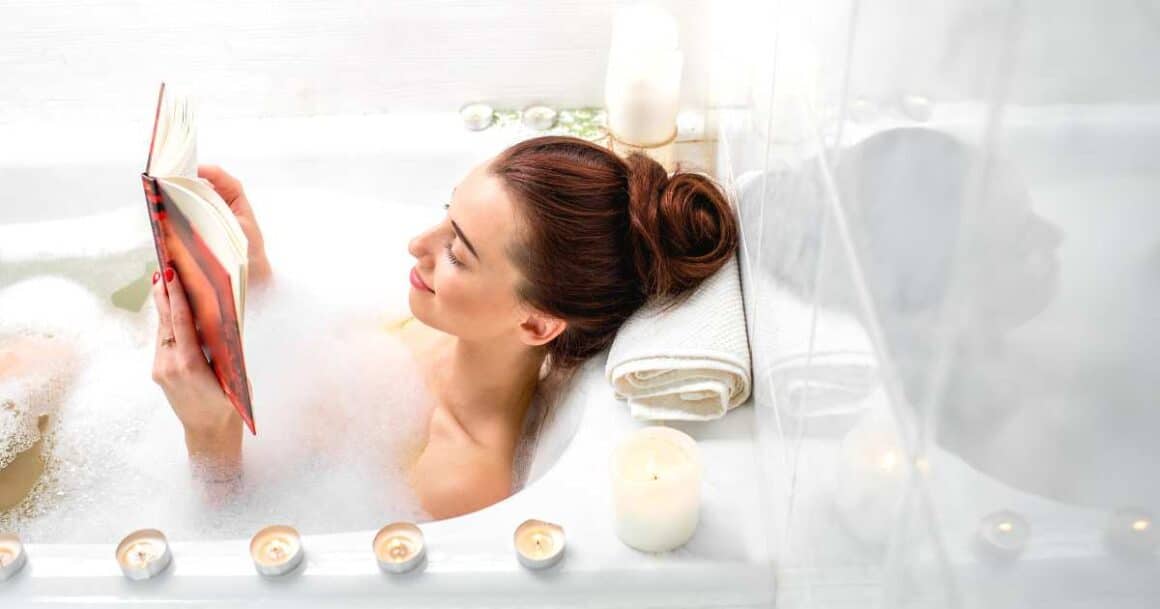
6. Take a relaxing bubble bath.
A warm bath can help ease tension and soothe sore muscles.
Set the Stage
A relaxing bath is a simple and effective way to practice self-care and reduce stress.
To make the most of your bath time, create a peaceful and calming atmosphere in your bathroom.
Dim the lights or light some candles, play soothing music, and bring a book or magazine to read.
Add in some goodness.
Adding Epsom salt, essential oils, or bath bombs can enhance the experience and provide additional benefits such as soothing sore muscles, improving circulation, and promoting better sleep.
Focus on the Present Moment
While soaking in the tub, try to clear your mind and focus on the present moment.
Then, take slow, deep breaths and allow yourself to relax fully. You can also try visualization or meditation techniques to enhance the relaxation further.
After your bath, take some time to rest and continue the relaxation.
Enjoy a cup of tea or something stronger 🙂
Make yourself a cup of herbal tea, listen to calming music, or lie down and allow yourself to unwind fully.
Related article: The Best Self-Care Bath Routine
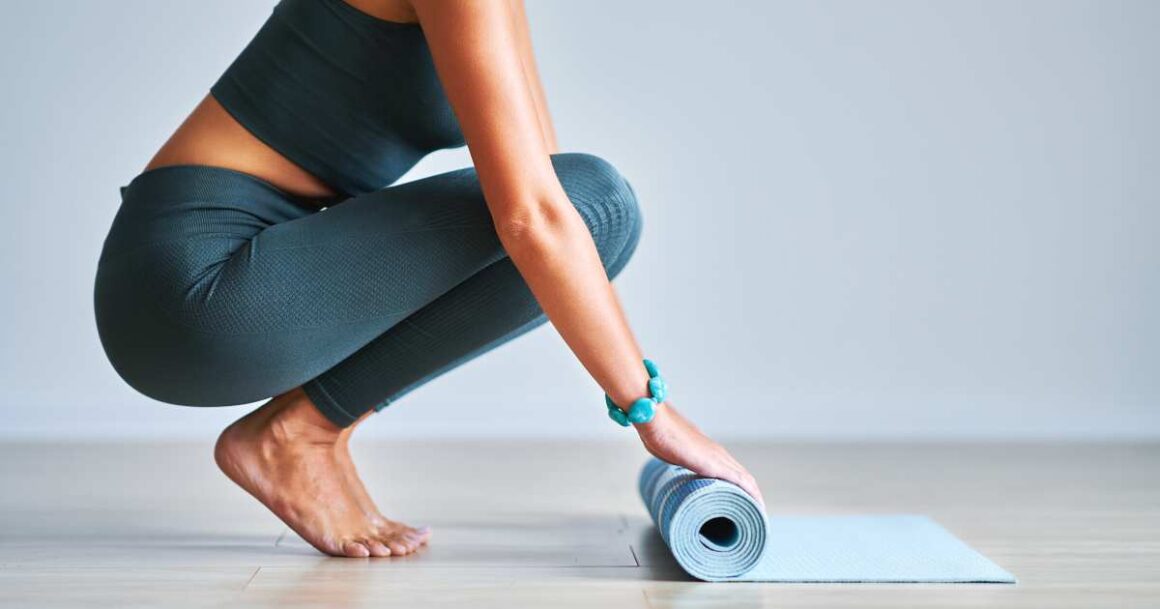
7. Practice Yoga or Meditation.
Practicing yoga or meditation is a beautiful way to care for your mental and emotional health.
Both practices can help calm your mind, reduce stress, and promote relaxation.
Yoga involves physical postures and movements, while meditation involves stillness and focusing on your breath or a specific object.
Ways to Practice Yoga:
Attend a yoga class: Find a local yoga studio or gym and attend a beginner’s yoga class.
This can be a great way to learn the basics of yoga and receive guidance and feedback from an experienced instructor.
Try Yoga YouTube:
There are an endless amount of yoga classes available for free on YouTube! My all-time favorite yoga channel is Yoga with Adriene.
She is a fantastic yoga teacher with years and years of experience.
Use a Yoga App
If you prefer a more structured approach, consider using a yoga app that guides you through various poses and sequences.
My favorite yoga app is GLO Yoga. It’s the best.
Attend a yoga retreat.
Consider attending a yoga retreat if you want a more immersive yoga experience. Yoga retreats help to deepen your practice, connect with like-minded individuals, and rejuvenate your mind and body.
You can find yoga retreats by visiting BookYogaRetreats.com
Meditation.
Meditation is a powerful practice that lets you calm your mind, connect with your inner self, and stay in the present moment.
Here are some ways to start Meditating:
Attend a meditation class.
Find a local meditation center or yoga studio that offers guided meditation classes.
Taking a meditation class is a great way to learn the basics of meditation and receive guidance from an experienced teacher.
Use a meditation app.
There are many meditation apps available that offer guided meditations for all levels. Some popular options include Headspace, Calm, and Insight Timer.
Try a meditation podcast.
There are many podcasts available that focus on meditation and mindfulness. Podcasts are a convenient option for practicing meditation on the go.
Check out this article called the top 10 Meditation Podcasts to learn more!
Set a timer and meditate on your own
Find a quiet and comfortable place to sit, set a timer for a desired time, and focus on your breath or a specific intention or mantra.
Attend a meditation retreat.
Going on a meditation retreat can provide a transformative experience!
If you are interested in attending a meditation retreat, VeryWellMind.com wrote a terrific article about the best meditation retreats for 2023 that you might find helpful.

8. Read a Good Book
Reading provides an escape from the stresses of daily life and allows you to immerse yourself in another world.
Whether you prefer novels, self-help books, or memoirs, there’s a book for everyone.
When choosing a book, think about what you enjoy and what inspires you.
Consider the genre, author, and subject matter. You can also ask for recommendations from friends or family members with similar reading tastes.
Related Article: The Most Inspirational Books for Women 40+
Once you’ve found a book that interests you, set aside time each day to read and make it a part of your self-care routine, such as reading before bed or during your lunch break.
Right now, I love Collen Hoover’s books! And I highly recommend them to anyone who loves a book you cannot put down!

9. Get outside
Fresh air and sunshine can do wonders for your physical and mental well-being, and there are many ways to enjoy the great outdoors.
You can walk around your neighborhood or local park, hike, garden, or sit outside and enjoy the sun and fresh air.
Even just a few minutes outside can make a big difference in your feelings.
In addition to improving your mood, spending time in nature has been shown to have several health benefits.
It can help reduce stress, lower blood pressure and heart rate, and improve immune function. It can also provide an opportunity to connect with others or enjoy quiet time alone. (source)

10. Practice Gratitude
Practicing gratitude is a simple yet powerful way to improve mental and emotional well-being. It involves focusing on the positive things in your life and feeling thankful for them.
Take a few minutes each day to reflect on what you’re grateful for – your health, family, friends, or a roof over your head.
By focusing on what you have rather than what you don’t have, you can shift your mindset to a more optimistic one.
Read this article: How to Cultivate an Attitude of Gratitude to learn more!

11. Try a New Hobby or two!
Exploring new hobbies can help you break your routine and provide a sense of accomplishment and fulfillment. It can also be a great way to reduce stress and improve your mood.
Whether painting, knitting, or learning a new language, find something that excites you and makes you feel alive.
Don’t be afraid to make mistakes or take your time trying a new hobby. Learning something new can be challenging, but it can also be rewarding and fun.
Related Article: New a New Hobby? I’ve got you!

12. Strengthen Social Connections
Strong social connections are essential for our well-being. Make time to connect with family, friends, and people in your community or neighborhood.
Connecting with friends and family is essential to self-care and can improve mental and emotional well-being.
Here are some ways to strengthen social connections:
Plan a social outing
Plan a coffee date, lunch, or dinner with a friend or family member.
Spending time in person can help strengthen relationships and provide a much-needed break from daily life.
Join a group or club.
Join a local group or club that aligns with your interests.
Being a part of a group or club will allow you to connect with like-minded individuals and make new friends.
Think gardening club, book club, or a club for your favorite hobby.
Join a support group.
There are support groups for everything you can think of.
Joining a support group can be a powerful way to practice self-care and a great place to connect with others who share similar experiences and challenges.
Whether you’re struggling with a specific issue like addiction, mental health, or chronic illness or simply looking for a supportive community to help you navigate life’s ups and downs, a support group can provide a safe and welcoming space to share, learn, and grow.
Here is an excellent article about how to find a support group that is right for you!
Attend events
Attending concerts, sports games, or theater performances can provide opportunities to bond over shared experiences and create lasting memories with friends and family.
Volunteer
Volunteering is an excellent way to prioritize self-care while also making a positive impact on your community.
Not only does volunteering provide opportunities to help others, but it can also help you meet new people and strengthen social connections.
Whether you’re passionate about animals, the environment, or social justice, countless volunteer opportunities are available to match your interests and skills.
Volunteering provides an opportunity to connect with others meaningfully, whether working side-by-side at a local food bank, cleaning up a park, or advocating for a cause you believe in.
Visit VolunteerMatch.org to learn more.
Related Article: How to Make Friends in Your 50s

13. Unplug.
Constantly checking emails, social media, and news updates can be overwhelming and draining.
Take a break from technology for a few hours or even a whole day. Use this time to disconnect and focus on other aspects of life.
You’ll be glad you did!
Ways to Limit Screen Time:
Set a schedule
Create a schedule with designated times for checking email, social media, and news updates. Stick to this schedule to avoid constantly checking your phone or computer.
Turn off notifications
Disable notifications for non-essential apps or turn off your phone entirely during certain times of the day.
Take breaks
Take regular breaks throughout the day to stretch, move around, and give your eyes a rest from screens.
Find other activities
Replace screen time with other activities, such as reading, exercising, or spending time with loved ones.
Use a screen time tracking app
There are several apps can help you track your screen time and set limits. Or, if you’ve got an Iphone here’s how you can track your screen time and limit screen time too!
Related Article: The Benefits of Digital Detox

14. Take Nap (And make a habit out of napping)
Getting enough rest is crucial for our physical and mental health.
Limiting screen time can reduce stress, improve sleep, and increase productivity. It’s important to prioritize self-care and take time to disconnect and focus on the present moment.
If you’re tired or overwhelmed, take a short nap to recharge. Even 20-30 minutes can significantly affect how you feel.
When you’re tired or overwhelmed, taking a short nap can help you recharge and feel more alert and focused.
Naps can also help reduce stress and improve cognitive function.
To take a nap effectively, find a quiet and comfortable space where you won’t be disturbed. Lie down or recline in a chair, and set the alarm for 20-30 minutes to ensure you don’t oversleep.
Close your eyes and focus on your breath or use a guided meditation app to help you relax and fall asleep.
Remember, napping isn’t a replacement for getting enough sleep at night.
Instead, aim to get 7-9 hours of sleep each night and use napping to supplement your sleep and help you feel more rested throughout the day.

15. Practice Self-compassion
We often hold ourselves to high standards and beat ourselves up when we fall short.
Practicing self-compassion means treating ourselves with the same kindness, understanding, and empathy we would offer a good friend. It involves recognizing our humanity and accepting our imperfections and mistakes.
Be gentle with yourself, and remember that you’re only human.
Related Article: 100 Powerful Self-love Affirmations
When you notice negative self-talk or self-criticism, take a moment to pause and reframe your thoughts.
Then, try offering yourself words of kindness, such as “It’s okay, I’m doing the best I can” or “Everyone makes mistakes sometimes.”
Remember that self-compassion is not about making excuses or avoiding accountability. It’s about treating yourself with the same care and respect you would offer others.
Self-love and self-compassion can improve self-esteem, reduce stress and anxiety, and cultivate greater well-being and happiness.
Take time to practice self-compassion daily, and notice how it positively impacts your overall outlook and mood.
You deserve to be kind to yourself and treat yourself with the same love and care you offer others.
Here are some ways you can practice self-love and self-compassion:
Treat yourself with kindness
Be kind to yourself when you make a mistake or fall short of your goals. Instead of criticizing or berating yourself, offer words of encouragement and understanding.
Take care of your body.
Prioritize your physical health by getting enough sleep, eating nutritious foods, and exercising regularly.
Listen to your body’s needs and give it the care and attention it deserves.
Practice mindfulness
Mindfulness meditation involves paying attention to the present moment with non-judgmental awareness. This can help you cultivate a greater sense of peace and acceptance.
Check out this article about how to get started with mindful meditation.
Set healthy boundaries
Set clear boundaries with others to protect your time and energy. Learn to say no to commitments that drain your energy or cause stress.
Related: How to Draw Healthy Boundaries
Surround yourself with positive people.
Spend time with people who uplift and support you. Distance yourself from those who are negative or bring you down.
Related article: Self-Kindness Auotes for a Happier You!

16. Practice Mindfulness
Practicing mindfulness is a powerful way to practice self-care and reduce stress.
Mindfulness involves paying attention to the present moment without judgment or distraction, which can help improve focus, reduce anxiety, and improve overall well-being.
Here are some tips for practicing mindfulness:
Start with your breath
Focus on your breath and try to notice the sensation of air moving in and out of your body. Count your breaths or repeat a calming word or phrase to help you stay focused.
Practice mindful movement
Engage in a gentle exercise like yoga, stretching, or walking, and focus on the sensation of motion in your body.
Use all your senses
Use all your senses to notice the world around you. Pay attention to your environment’s sights, sounds, smells, and tastes.
Practice non-judgment or Mindfulness meditation
When thoughts or emotions arise, acknowledge them without judgment or criticism. Simply notice them and let them go.
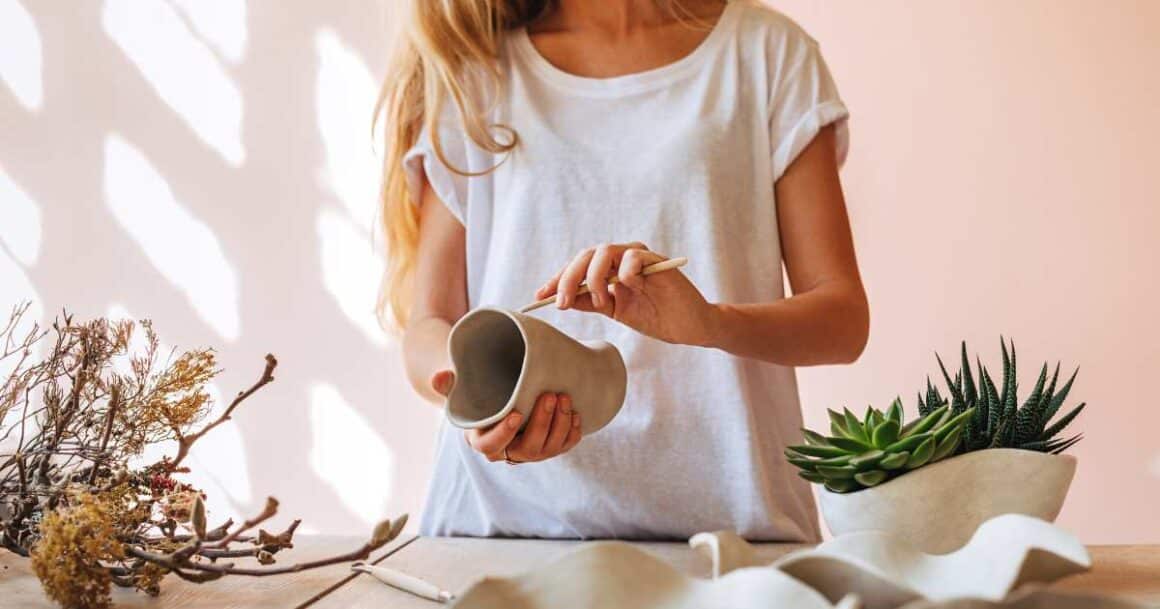
17. Get Creative
Engaging in creative activities such as writing, drawing, painting, or playing music can provide a healthy outlet for your thoughts and emotions and reduce stress and anxiety.
These activities allow you to express yourself in a way that is personal and unique to you and can also be a way to explore and process difficult emotions.
Creativity can also help improve cognitive function and increase problem-solving skills.
Here are some creative self-care activities that you can try:
- Painting or drawing
- Color in an adult coloring book
- Make pottery or Paint Ceramics
- Knitting or crocheting
- Writing in a journal or starting a blog
- Learning a new instrument or practicing an old one
- Taking a dance or art class
- Scrapbooking or making a vision board
- Making your candles or soap
- Practicing calligraphy or hand-lettering
- Baking or cooking a new recipe
- Taking photographs or creating a photo album
- Making collages or mixed media art
- Designing and decorating your own planner or bullet journal
- Gardening or taking care of plants
- DIY projects such as home decor or furniture renovation.

18. Make a Sleep Hygiene Plan
I cannot stress how important it is to ensure you are getting enough sleep.
Making a sleep hygiene plan is essential to self-care and can help improve the quality and quantity of your sleep.
Here are some steps to create a sleep hygiene plan:
Set a consistent sleep schedule
Try to go to bed and wake up simultaneously each day, even on weekends. This can help regulate your Practicingclock and improve quality.
Adults need at least 7 hours of sleep per night.
Create a bedtime routine.
Establish a relaxing routine you can do each night before sleep. This can include reading a book, bathing, or practicing relaxation techniques.
Create a comfortable sleep environment.
Ensure your bedroom is quiet, calm, and dark. Use comfortable bedding and pillows, and remove any distractions like electronic devices.
Limit caffeine, alcohol, and sugar in the New Year!
Avoid caffeine and alcohol, and sugar close to bedtime, as they can disrupt sleep.
Exercise regularly
Regular exercise can improve sleep quality and duration. Aim to exercise at least 30 minutes of physical activity thrice weekly.
Avoid screens before bed
Screen exposure, such as smartphones and tablets, can disrupt sleep patterns. Avoid screens for at least an hour before bedtime.
Consider sleep aids
If you’re having trouble sleeping, consider using natural aids like herbal teas or supplements like melatonin.
Even after constantly practicing good sleep hygiene, and you have tried natural sleep aids, I suggest consulting professional help.
Related article: The Best Self-Care Morning Routine

19. Binge Your Favorite Movies
Binge-watching your all-time favorite movies is a great way to unwind and practice self-care.
Whether it’s a classic romantic comedy, an action-packed thriller, or a heartwarming family drama, revisiting old favorites can bring comfort and nostalgia.
Create a cozy and comfortable space with plenty of blankets and pillows to make the most of your movie binge session.
Prepare snacks or a light meal, such as popcorn, pizza, or your favorite comfort food.
And don’t forget to turn off your phone and other distractions to immerse yourself in the movie experience fully.
Watching your favorite movies can provide a sense of escape and relaxation, allowing you to forget about the stresses of daily life for a little while.
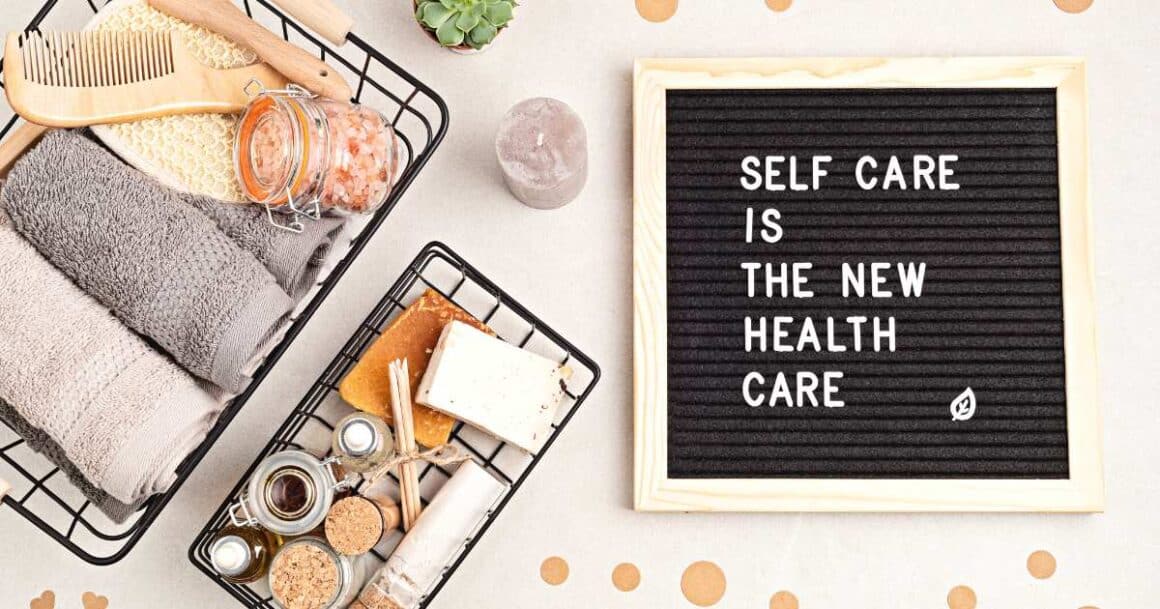
FAQs: Self-Care Ideas for Women for The New Year!
What is self-care?
Self-care refers to individuals’ actions to maintain their physical, mental, and emotional well-being.
Why is self-care important for women?
Women often juggle multiple roles and responsibilities, leading to burnout and neglect of their needs. Self-care is essential for women to recharge, relax, and rejuvenate.
What are some popular self-care practices?
Self-care practices can include eating a healthy breakfast, taking a relaxing bath, practicing yoga or meditation, reading a book, getting outside, and connecting with loved ones-just, to name a few!
How often should I practice self-care?
Every. Single. Day. Self-care should be a regular practice, ideally incorporated into your daily routine. Even just a few minutes a day can significantly impact how you feel.
What are the benefits of practicing self-care?
Practicing self-care can help reduce stress, increase happiness, and improve overall well-being. It can also help you show up as your best self in all areas of your life.
Related Self-Care Articles
- The Self-care Alphabet
- 100 Life Essentials for Every Woman
- Books for Finding Purpose
- Best Books for Overthinkers
- How to Practice Spiritual Self-care
- Powerful Gratitude Affirmations
- 100 Things to Keep in Your Purse
- Midlife Crisis in Women
- Best Inspirational Books for Women
- Inspirational Quotes for Women
- Great Books for Overthinkers
Conclusion: Self-care Ideas for Women for the New Year
Practicing self-care is essential for women to prioritize their physical, mental, and emotional health and well-being.
Incorporating self-care activities into our daily routines can reduce stress, improve mood, and cultivate balance and fulfillment.
I hope these self-care ideas for women have inspired you to prioritize self-care and explore new ways to care for yourself.
What are some of your favorite self-care activities? I would love to hear from you in the comments below.
Until next time,
Be well!
XO, Christine

I’ve been keeping it real since 1963. 😊
I’m a child of God, devoted wife, proud mama and grandma, full-time creative, domestic engineer, and passionate self-care enthusiast.
I’m purpose-driven and do my best to live each day with intention—whether shopping for treasures, painting in my art studio, digging in the garden, or cooking up something yummy for my family.
I’m always up for a good chat and love collaborating with fellow creatives and brands.
Let’s connect—don’t be shy!






